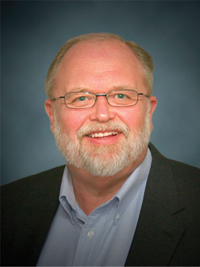From the President
A Strategic Alliance
by Bill Hamel

One of the remaining hidden people groups both in society and the church today is that of individuals with disabilities. In many parts of the world, they are seen as “throwaway people,” yet they are part of the “all people” whom Jesus loves, and they are made in His image.
One day Jesus went to eat at the house of a prominent Pharisee on the Sabbath. When he noticed the guests picking the places of honor at the table, he told them a parable about humility. At the conclusion, he added, “When you give a luncheon or dinner, do not invite your friends, your brothers or sisters, your relatives, or your rich neighbors; if you do, they may invite you back and so you will be repaid.
“But when you give a banquet, invite the poor, the crippled, the lame, the blind, and you will be blessed. Although they cannot repay you, you will be repaid at the resurrection of the righteous” (Luke 14:1-14).In the past, the Church took that mandate seriously, founding ministries that cared for the least of these. What would happen if the Church again took that mandate seriously?
I believe that two things would happen. First, our hearts would be profoundly changed. Those with disabilities have so much to teach us, having lived with challenges we cannot imagine. Second, our churches would grow, because anyone who will care for and provide dignity to those with disabilities is deeply appreciated by them and by their families. Love and service make a profound difference to this hidden population.
As the EFCA, we are taking this mandate seriously. I am pleased to announce a strategic ministry alliance with what I believe is the premier ministry worldwide in championing the care of those with disabilities: Joni and Friends. This ministry, led by Joni Eareckson Tada, has materials and training to help churches initiate ministries to and through those with disabilities.
Read Joni’s article, and as you think of your own church, keep in mind what another author in this issue advised: Start with one person, one family at your church—love them, determine their needs and what they have to offer, and weave them into the life of your church. Indeed, you will be repaid in blessings abundant.
Letter From the President
One of the remaining hidden people groups both in society and the church today is that of individuals with disabilities. In many parts of the world, they are seen as “throwaway people,” yet they are part of the “all people” whom Jesus loves, and they are made in His image.
One day Jesus went to eat at the house of a prominent Pharisee on the Sabbath. When he noticed the guests picking the places of honor at the table, he told them a parable about humility. At the conclusion, he added, “When you give a luncheon or dinner, do not invite your friends, your brothers or sisters, your relatives, or your rich neighbors; if you do, they may invite you back and so you will be repaid.
“But when you give a banquet, invite the poor, the crippled, the lame, the blind, and you will be blessed. Although they cannot repay you, you will be repaid at the resurrection of the righteous” (Luke 14:1-14). In the past, the Church took that mandate seriously, founding ministries that cared for the least of these. What would happen if the Church again took that mandate seriously?
I believe that two things would happen. First, our hearts would be profoundly changed. Those with disabilities have so much to teach us, having lived with challenges we cannot imagine. Second, our churches would grow, because anyone who will care for and provide dignity to those with disabilities is deeply appreciated by them and by their families. Love and service make a profound difference to this hidden population.
As the EFCA, we are taking this mandate seriously. I am pleased to announce a strategic ministry alliance with what I believe is the premier ministry worldwide in championing the care of those with disabilities: Joni and Friends. This ministry, led by Joni Eareckson Tada, has materials and training to help churches initiate ministries to and through those with disabilities.
Read Joni’s article, and as you think of your own church, keep in mind what another author in this issue advised: Start with one person, one family at your church—love them, determine their needs and what they have to offer, and weave them into the life of your church. Indeed, you will be repaid in blessings abundant.